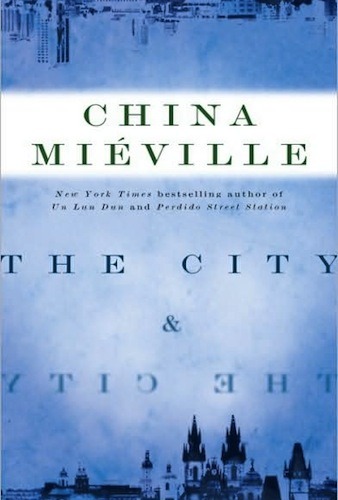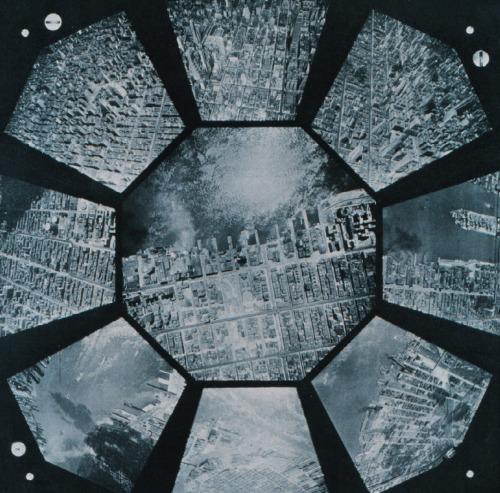The guillotine is the concretion of the law; it is called the Avenger: it is not neutral and does not permit you to remain neutral.
Photogrammetry key chart for survey flyovers of the Mississippi Delta
The City & The City (China Mieville, 2009)
This book has been recommended by many a shelf tag in book stores, and won a number of prizes last year, or maybe the year before. At any rate, like The Wind-Up Girl, it was showered with praise and I looked forward to being pleasantly surprised by one of the more critically-acclaimed sci-fi books out there. Alas, I have been deceived again, and while the book is certainly not bad, it’s rather disappointing and any reader must immediately acknowledge that the setting’s potential was squandered on a ho-hum story and an abrupt, unsatisfying ending.
So parents often err, many fond mothers especially, doat so much upon their children, like Aesop’s ape, till in the end they crush them to death, Corporum nutrices animarum novercaie, pampering up their bodies to the undoing of their souls: they will not let them be corrected or controlled, but still soothed up in everything they do, that in conclusion “they bring sorrow, shame, heaviness to their parents” (Eccles. xxx, 8, 9), “become wanton, stubborn, wilful, and disobedient”; rude, untaught, headstrong, incorrigible, and graceless. “They love them so foolishly,” saith Cardan, “that they rather seem to hate them, bringing them up not to virtue but injury, not to learning but to riot, not to sober life and conversation but to all pleasure and licentious behaviour.”
chromatic typewriter
Au Revoir Borealis – “Bella Ballerina”
Dark Enough For Stars
A wispy, melancholy instrumental from this shoegaze-y 2008 album. Would work well as background music for a day-in-the-life montage of a forlorn and lonely grocery bagger. (site)
Many mortal men came to see fair Psyche, the glory of her age, they did admire her, commend, desire her for her divine beauty, and gaze upon her; but as on a picture; none would marry her, quod indotata [because she had no dowry]; fair Psyche had no money. So they do by learning.
Extracts from Olaf Stapledon’s “Last and First Men”
 In the Far West, the United States of America openly claimed to be custodians of the whole planet. Universally feared and envied, universally respected for their enterprise, yet for their complacency very widely despised, the Americans were rapidly changing the whole character of man’s existence. By this time every human being throughout the planet made use of American products, and there was no region where American capital did not support local labour. Moreover the American press, gramophone, radio, cinematograph and televisor ceaselessly drenched the planet with American thought. Year by year the aether reverberated with echoes of New York’s pleasures and the religious fervours of the Middle West. What wonder, then, that America, even while she was despised, irresistibly moulded the whole human race. This, perhaps, would not have mattered, had America been able to give of her very rare best. But inevitably only her worst could be propagated. Only the most vulgar traits of that potentially great people could get through into the minds of foreigners by means of these crude instruments. And so, by the floods of poison issuing from this people’s baser members, the whole world, and with it the nobler parts of America herself, were irrevocably corrupted.
In the Far West, the United States of America openly claimed to be custodians of the whole planet. Universally feared and envied, universally respected for their enterprise, yet for their complacency very widely despised, the Americans were rapidly changing the whole character of man’s existence. By this time every human being throughout the planet made use of American products, and there was no region where American capital did not support local labour. Moreover the American press, gramophone, radio, cinematograph and televisor ceaselessly drenched the planet with American thought. Year by year the aether reverberated with echoes of New York’s pleasures and the religious fervours of the Middle West. What wonder, then, that America, even while she was despised, irresistibly moulded the whole human race. This, perhaps, would not have mattered, had America been able to give of her very rare best. But inevitably only her worst could be propagated. Only the most vulgar traits of that potentially great people could get through into the minds of foreigners by means of these crude instruments. And so, by the floods of poison issuing from this people’s baser members, the whole world, and with it the nobler parts of America herself, were irrevocably corrupted.For the best of America was too weak to withstand the worst. Americans had indeed contributed amply to human thought. They had helped to emancipate philosophy from ancient fetters. They had served science by lavish and rigorous research. In astronomy, favoured by their costly instruments and clear atmosphere, they had done much to reveal the dispositions of the stars and galaxies. In literature, though often they behaved as barbarians, they had also conceived new modes of expression, and moods of thought not easily appreciated in Europe. They had also created a new and brilliant architecture. And their genius for organization worked upon a scale that was scarcely conceivable, let alone practicable, to other peoples. In fact their best minds faced old problems of theory and of valuation with a fresh innocence and courage, so that fogs of superstition were cleared away wherever these choice Americans were present. But these best were after all a minority in a huge wilderness of opinionated self-deceivers, in whom, surprisingly, an outworn religious dogma was championed with the intolerant optimism of youth. For this was essentially a race of bright, but arrested, adolescents. Something lacked which should have enabled them to grow up. One who looks back across the aeons to this remote people can see their fate already woven of their circumstance and their disposition, and can appreciate the grim jest that these, who seemed to themselves gifted to rejuvenate the planet, should have plunged it, inevitably, through spiritual desolation into senility and age-long night.
What might not this energy have achieved, had it been more critically controlled, had it been forced to attend to life’s more forbidding aspects! Direct tragic experience might perhaps have opened the hearts of this people. Intercourse with a more mature culture might have refined their intelligence. But the very success which had intoxicated them rendered them also too complacent to learn from less prosperous competitors.
Yet there was a moment when this insularity promised to wane. So long as England was a serious economic rival, America inevitably regarded her with suspicion. But when England was seen to be definitely in economic decline, yet culturally still at her zenith, America conceived a more generous interest in the last and severest phase of English thought. Eminent Americans themselves began to whisper that perhaps their unrivalled prosperity was not after all good evidence either of their own spiritual greatness or of the moral rectitude of the universe. A minute but persistent school of writers began to affirm that America lacked self-criticism, was incapable of seeing the joke against herself, was in fact wholly devoid of that detachment and resignation which was the finest, though of course the rarest, mood of latter-day England. This movement might well have infused throughout the American people that which was needed to temper their barbarian egotism, and open their ears once more to the silence beyond man’s strident sphere. Once more, for only latterly had they been seriously deafened by the din of their own material success. And indeed, scattered over the continent throughout this whole period, many shrinking islands of true culture contrived to keep their heads above the rising tide of vulgarity and superstition.
Thus it was that America sank further and further into Americanism. Vast wealth and industry, and also brilliant invention, were concentrated upon puerile ends. In particular the whole of American life was organized around the cult of the powerful individual, that phantom ideal which Europe herself had only begun to outgrow in her last phase. Those Americans who wholly failed to realize this ideal, who remained at the bottom of the social ladder, either consoled themselves with hopes for the future, or stole symbolical satisfaction by identifying themselves with some popular star, or gloated upon their American citizenship, and applauded the arrogant foreign policy of their government.








